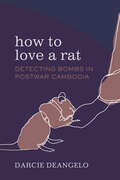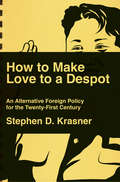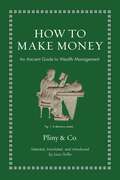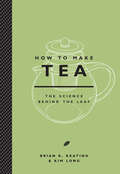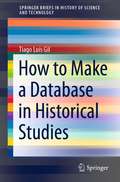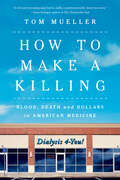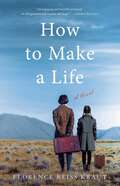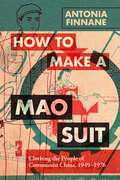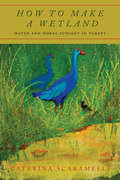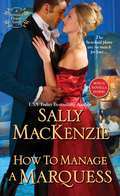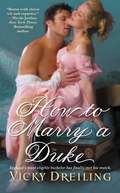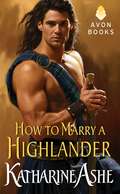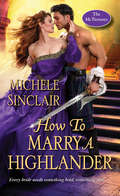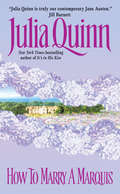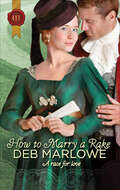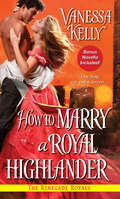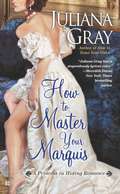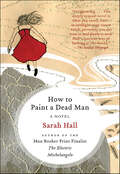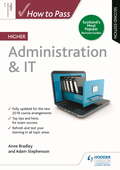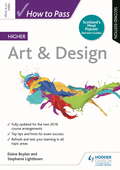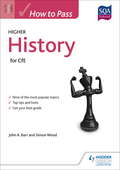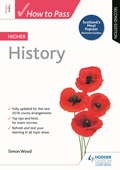- Table View
- List View
How to Love a Rat: Detecting Bombs in Postwar Cambodia (Atelier: Ethnographic Inquiry in the Twenty-First Century #17)
by Darcie DeAngeloHow to Love a Rat takes place in a Cambodian minefield. Working amid hidden bombs, former war combatants use explosive-sniffing rats to clear mines from the land. In total, an estimated four to six million landmines in Cambodia have been left behind by wars that ended decades ago. This has created the conditions for a flourishing mine-clearance industry, where workers who were once enemy combatants may now be employed on the same clearance teams. Zeroing in on two distinct sets of feelings, Darcie DeAngelo paints a portrait of the love experienced between humans and rats and the suspicions felt between former adversaries turned coworkers. In doing so, she points to how human-animal relationships in the minefield produce models for relationality among people from opposing sides of war. The ways the deminers love the rats mediate both the traumatic violence of the past and the uncertain dangers of the minefield. The book's stories depict an transformative postwar ecology emerging through human-nonhuman relationships, including those shared between humans and rats, landmines, and spirits.
How to Make Love to a Despot: And Other Ways To Change American Foreign Policy In The Twenty-first Century
by Stephen D. KrasnerAfter generations of foreign policy failures, the United States can finally try to make the world safer—not by relying on utopian goals but by working pragmatically with nondemocracies. Since the end of the Second World War, the United States has sunk hundreds of billions of dollars into foreign economies in the hope that its investments would help remake the world in its own image—or, at the very least, make the world “safe for democracy.” So far, the returns have been disappointing, to say the least. Pushing for fair and free elections in undemocratic countries has added to the casualty count, rather than taken away from it, and trying to eliminate corruption entirely has precluded the elimination of some of the worst forms of corruption. In the Middle East, for example, post-9/11 interventionist campaigns in Afghanistan and Iraq have proved to be long, costly, and, worst of all, ineffective. Witnessing the failure of the utopian vision of a world full of market-oriented democracies, many observers, both on the right and the left, have begun to embrace a dystopian vision in which the United States can do nothing and save no one. Accordingly, calls to halt all assistance in undemocratic countries have grown louder. But, as Stephen D. Krasner explains, this cannot be an option: weak and poorly governed states pose a threat to our stability. In the era of nuclear weapons and biological warfare, ignoring troubled countries puts millions of American lives at risk. “The greatest challenge for the United States now,” Krasner writes, “is to identify a set of policies that lie between the utopian vision that all countries can be like the United States . . . and the dystopian view that nothing can be done.” He prescribes a pragmatic new course of policy. Drawing on decades of research, he makes the case for “good enough governance”—governance that aims for better security, better health, limited economic growth, and some protection of human rights. To this end, Krasner proposes working with despots to promote growth. In a world where a single terrorist can kill thousands or even hundreds of thousands of people, the United States does not have the luxury of idealistically ignoring the rest of the world. But it cannot remake the world in its own image either. Instead, it must learn how to make love to despots.
How to Make Money: An Ancient Guide to Wealth Management (Ancient Wisdom For Modern Readers Ser.)
by Pliny Co.An enriching collection of classical writings about how ancient Romans made—and thought about—moneyAncient Romans liked money. But how did they make a living and sometimes even become rich? The Roman economy was dominated by agriculture, but it was surprisingly modern in many ways: the Romans had companies with CEOs, shareholders, and detailed contracts regulated by meticulous laws; systems of banking and taxation; and a wide range of occupations, from merchant and doctor to architect and teacher. The Romans also enjoyed a relatively open society, where some could start from the bottom, work, invest, and grow rich. How to Make Money gathers a wide variety of ancient writings that show how Romans thought about, made, invested, spent, lost, and gave away money.The Roman elite idealized farming and service to the state but treated many other occupations with suspicion or contempt, from money lending to wage labor. But whatever their attitudes, pecunia made the Roman world go round. In the Satyricon, Trimalchio brags about his wealth. Seneca accumulated a fortune—but taught that money can&’t buy happiness. Eumachia inherited a brick factory from her father, married well, and turned to philanthropy after she was widowed. How to Make Money also takes up some of the most troubling aspects of the Roman economy, slavery and prostitution, which the elite deemed unrespectable but often profited from.Featuring lively new translations, an illuminating introduction, and the original Latin and Greek texts on facing pages, How to Make Money offers a revealing look at the Roman worlds of work and money.
How to Make Tea: The Science Behind the Leaf
by Kim Long Brian KeatingHow do you like your tea? A guide to the art and science of this ancient culinary comfort.In How to Make Tea, tea experts Brian Keating and Kim Long will teach you everything you need to know to make your desired cup. We’ve been drinking tea for thousands of years, yet few of us realize that all tea types—from elegant lapsang to pungent pu-erh—come from the same plant. But how are there so many different styles? It comes down to science: geography, biology, chemistry, and physics; the application of heat and pressure; and the magic of time and enzymes. How to Make Tea breaks down these elements and lays out the techniques, tools, and methods needed to brew at home. With this guide, tea lovers of all stripes will become experts on the art and science of tea—and learn to extract the best from every cup.
How to Make a Database in Historical Studies (SpringerBriefs in History of Science and Technology)
by Tiago Luís GilThis book is a greatly supplemented translation from Portuguese, originally published in 2015. It discusses the most appropriate ways to create databases for research on history and other humanities, including an extensive debate about the usages that historians have made of computing since the 1950s. It has four chapters: the first is dedicated to theoretical and methodical questions about the usage of databases in history; the second is about technical issues; the third presents the concept of research engineering (how to improve research in groups); the last is about the construction of databases. The author states that the use of technology in research in history and humanities should be preceded and mediated by theories and methods which deal with these disciplines and not by technical issues. The historian must know how to think “correctly” in order to use the technological tools in an autonomous way. The book provides a background, demonstrating how theory, methodology, and technique are always articulated in historical research, and will appeal to history students and researchers.
How to Make a Killing: Blood, Death And Dollars In American Medicine
by Tom Mueller“Inspiring and deeply distressing.” —Ezekiel J. Emanuel, author of Which Country Has the World’s Best Health Care? How did a lifesaving medical breakthrough become a for-profit enterprise that threatens many of the people it’s meant to save? Six decades ago, visionary doctors achieved the impossible: the humble kidney, acknowledged since ancient times to be as essential to life as the heart, became the first human organ to be successfully replaced with a machine. Yet huge dialysis corporations, ambitious doctor-entrepreneurs and Beltway lobbyists soon turned this medical miracle into an early experiment in for-profit medicine—and one of the nation’s worst healthcare catastrophes. With powerful insight and on-the-ground reporting, New York Times best-selling author Tom Mueller introduces an unforgettable cast of characters. Heroic patients, including a Hollywood stuntman and body double, risk their lives to blow the whistle on how they’ve been mistreated. An unpaid activist living in a south Georgia trailer park fights to save patients from involuntary discharge from their lifesaving care. Industry insiders put their careers on the line to speak out about the endemic wrongs and pervasive inequality they’ve witnessed—and about dialysis executives who dress as musketeers and Star Wars characters to exhort their employees to more aggressive profit-seeking. Mueller evokes the scientific ingenuity and optimism of the 1950s and 1960s, when the burgeoning field of organ transplant and early dialysis machines offered long-awaited hope for lifesaving care. That is, until a New York salesman had himself dialyzed on the floor of the House, and Congress made renal disease the only “Medicare for All” condition—opening the financial floodgates for Big Dialysis. Of the thousands caught in a web of corporate greed, a disproportionate number are Black and Latino, highlighting the stark racial divides already endemic to American medicine. How to Make a Killing reveals dialysis as a microcosm of American medicine and poses a vital challenge: find a way to fix dialysis, and we’ll have a fighting chance of fixing our country’s dysfunctional healthcare system as a whole, restoring patients, not profits, as its true purpose.
How to Make a Life: A Novel
by Florence Reiss Kraut&“An engaging and heartfelt portrayal of intergenerational trauma and hope.&”—Kirkus ReviewsWhen Ida and her daughter Bessie flee a catastrophic pogrom in Ukraine for America in 1905, they believe their emigration will ensure that their children and grandchildren will be safe from harm. But choices and decisions made by one generation have ripple effects on those who come later—and in the decades that follow, family secrets, betrayals, and mistakes made in the name of love threaten the survival of the family: Bessie and Abe Weissman&’s children struggle with the shattering effects of daughter Ruby&’s mental illness, of Jenny&’s love affair with her brother-in-law, of the disappearance of Ruby&’s daughter as she flees her mother&’s legacy, and of the accidental deaths of Irene&’s husband and granddaughter.A sweeping saga that follows three generations from the tenements of Brooklyn through WWII, from Woodstock to India, and from Spain to Israel, How to Make a Life is the story of a family who must learn to accept each other&’s differences—or risk cutting ties with the very people who anchor their place in the world.
How to Make a Mao Suit: Clothing the People of Communist China, 1949–1976 (Cambridge Studies in the History of the People's Republic of China)
by Antonia FinnaneWhen the People's Republic of China was founded in 1949, new clothing protocols for state employees resulted in far-reaching changes in what people wore. In a pioneering history of dress in the Mao years (1949–1976), Antonia Finnane traces the transformation, using industry archives and personal stories to reveal a clothing regime pivoted on the so-called 'Mao suit'. The time of the Mao suit was the time of sewing schools and sewing machines, pattern books and homemade clothes. It was also a time of close economic planning, when rationing meant a limited range of clothes made, usually by women, from limited amounts of cloth. In an area of scholarship dominated by attention to consumption, Finnane presents a revisionist account focused instead on production. How to Make a Mao Suit provides a richly illustrated account of clothing that links the material culture of the Mao years to broader cultural and technological changes of the twentieth century.
How to Make a Wetland: Water and Moral Ecology in Turkey
by Caterina ScaramelliHow to Make A Wetland tells the story of two Turkish coastal areas, both shaped by ecological change and political uncertainty. On the Black Sea coast and the shores of the Aegean, farmers, scientists, fishermen, and families grapple with livelihoods in transition, as their environment is bound up in national and international conservation projects. Bridges and drainage canals, apartment buildings and highways—as well as the birds, water buffalo, and various animals of the regions—all inform a moral ecology in the making. Drawing on six years of fieldwork in wetlands and deltas, Caterina Scaramelli offers an anthropological understanding of sweeping environmental and infrastructural change, and the moral claims made on livability and materiality in Turkey, and beyond. Beginning from a moral ecological position, she takes into account the notion that politics is not simply projected onto animals, plants, soil, water, sediments, rocks, and other non-human beings and materials. Rather, people make politics through them. With this book, she highlights the aspirations, moral relations, and care practices in constant play in contestations and alliances over environmental change.
How to Manage a Marquess (Spinster House #2)
by Sally MackenzieIn USA Today bestselling author Sally MacKenzie's charming Spinster House series, love is always a welcome guest...Two possible futures loom before Miss Anne Davenport. <P> The first option: sharing an unhappy home with her father and soon-to-be stepmother. The second: a life of independence at the Spinster House--if only her friend, Cat, would vacate the premises and marry the Duke of Hart. A well-placed whisper about the pair's secret tryst might speed the course of true love. But the duke's stubborn cousin poses an obstacle. A ridiculously handsome, very persuasive obstacle...Nate, Marquess of Haywood, has spent his life looking out for the duke, hoping to stave off a family curse. The only way to keep his cousin alive is to keep him single. That means convincing the intriguing Miss Davenport that her lovely lips could be put to far better use than gossiping. Kissing, for instance. In fact, Nate is beginning to hope that Miss Davenport's destiny lies not in the Spinster House at all, but with him ...Sally MacKenzie's novels are..."Naked, noble, and irresistible!" --Eloisa James"Perfect." --RT Book Reviews"Great fun." --Publishers Weekly
How to Marry a Duke (How To #1)
by Vicky DreilingTristan, the Duke of Shelbourne is a man with a mission: find a wife he can tolerate as long as they both shall live. Love is not necessary--nor desired. But how to choose among a dizzying array of wealthy-yet-witless candidates? Hire London's infamously prim and proper matchmaker. Then pretend she's not the most captivating woman he's ever met. . . Helping a devilish Duke create a contest to pick his perfect mate is the kind of challenge Tessa Mansfield relishes. Her methods may be scandalous, but she's determined to find the notorious bachelor more than a wife--she'll bring him true love. Yet when Tessa watches the women view for the Duke's affections, she longs to win his heart herself. And after a stolen kiss confirms Tristan's desire, Tessa knows she has broken a matchmaker's number one rule: never fall in love with the groom.
How to Marry a Highlander: A Falcon Club Novella
by Katharine AsheWith seven troublesome half sisters to marry off, Duncan, the Earl of Eads, has one problem: hes broke. With the prospect of marriage to the pompous local curate, Miss Teresa Finch-Freeworth has one dream: to wed instead the handsome Highlander she saw at a ball. How does a desperate lady convince a reluctant laird that shes the perfect bride for him? She strikes a wager If she can find seven husbands for seven sisters, the earl must marry her. Duncan has no intention of wedding the meddlesome maiden, and he gives her a deadline even the most audacious matchmaker cant meet--one month. But Teresa sets terms, too: with each bridegroom she finds, the earl must pay her increasingly intimate rewards . . .
How to Marry a Highlander: A Steamy Medieval Scottish Romance (The McTiernays #8)
by Michele SinclairA battle-hardened soldier, he is bound to the McTiernay brothers by a loyalty as strong as blood. But no woman in all of Scotland has been able to lay claim to his heart … UNBRIDLED PASSION A commander in the McTiernay clan, Dugan is known far and wide for his skills with a sword—and his skills in seduction. His rugged countenance and arrogant swagger are a lethal combination for the women who try to tame him and fail. Until a mysterious firebrand tempts him with her wicked ways … SHOCKING BETRAYAL All Adanel Mackbaythe knows about her Highland lover is that he is a McTiernay soldier—and a means of escaping her cruel father. But Dugan is a not a man to be toyed with. His distrust of Adanel’s motives will put a distance between them that can’t be breached. Yet when their secret trysts are discovered—sparking a war between clans—a lust for vengeance will drive Dugan back into her arms, where he will embark on his greatest battle: for her heart … Praise for The Most Eligible Highlander in Scotland “Steamy … packs the erotic punch of its predecessors.” —Publishers Weekly “Humor combines with romance, and the roller coaster ride to love will sweep readers into a fast-paced, charming, and rollicking love story.” —RT Book Reviews
How to Marry a Marquis (Agents for the Crown #2)
by Julia Quinn(An Avon Romantic Treasure) When James Sidwell, Marquis of Riverdale, offered to help Elizabeth Hotchkiss find herself a husband, he never dreamed that the only candidate he could propose would be himself...
How to Marry a Rake (Diamonds Of Welbourne Manor Spin Off Ser. #1040)
by Deb MarloweThis spin-off from The Diamonds of Welbourne Manor is “a fun, flirty, fantastic read! . . . If you love Regency romances, don’t miss out on this one” (Love Romance Passion).Back from Europe, heiress Mae Halford has mended her heart after her friend Stephen Manning’s rejection. Looking radiant and full of confidence, she’s ready to find herself a husband!Only, the first man she bumps into at a Newmarket house party is Lord Stephen himself! When the two find themselves covertly working together to find a missing prized racehorse, romance blossoms. But can Mae believe that Stephen has changed enough that their adventure will lead to the altar?“A rollicking good story, How to Marry a Rake is Deb Marlowe at her best . . . The background of the Newmarket racing scene makes for a unique setting and there are plenty of secondary characters to add to this well-written story.” —Romance Reviews Today
How to Marry a Royal Highlander (The Renegade Royals #4)
by Vanessa KellyIllegitimate yet thoroughly irresistible, the Renegade Royals are leaving behind their careers as daring spies for the greatest adventure of all...At sixteen, Alasdair Gilbride, heir to a Scottish earldom, fled the Highlands and an arranged betrothal. Ten years later, Alasdair must travel home to face his responsibilities. It's a task that would be much easier without the distracting presence of the most enticing woman he's ever met...After one escapade too many, Eden Whitney has been snubbed by the ton. The solution: rusticating in the Scottish wilderness, miles from all temptation. Except, of course, for brawny, charming Alasdair. The man is so exasperating she'd likely kill him before they reach the border--if someone else weren't trying to do just that. Now Eden and Alasdair are plunging into a scandalous affair with his life and her reputation at stake--and their hearts already irreparably lost...
How to Master Your Marquis
by Juliana GrayThree intrepid princesses find themselves targets in a deadly plot against the crown--until their uncle devises a brilliant plan to keep them safe... Of all her sisters, Princess Stefanie is by far the least amenable to law and order, which is why she's appalled to find herself masquerading as an unbearably drab clerk for the most honorable barrister in England. But her dull disguise turns out to have its privileges: namely, the opportunity to consort unchaperoned with her employer's exceedingly handsome nephew, James Lambert, the Marquess of Hatherfield. Hatherfield quickly realizes that his uncle's spirited new clerk is, in fact, a lovely young woman of daring habits. The outwardly impeccable marquis isn't about to reveal her deception. After all, he's hiding a dangerous secret of his own. But when one too many escapades with the madcap princess bring Hatherfield's troubled past to light, it is only Stefanie's sharp wits that stand between the marquis and utter disaster, and only Hatherfield's daring that can save the princess from the shadowy agents bent on finding her.
How to Murder Your Wealthy Lovers and Get Away With It: Money & Mayhem in the Gilded Age
by Jane Simon Ammeson“Minnie Wallace Walkup Ketcham’s criminal career as an unsung triple murderess and black widow . . . is told in rich detail and with pleasingly dark wit.” —Keven McQueen, author of Louisville Murder & MayhemWhat’s a gal to do when her loaded lover is getting to be a nuisance? Why, just murder him and take all his money, of course. If you want to be fabulously single with tons of cash, just follow the lead of the beautiful and conniving Minnie Wallace Walkup Ketcham, who left a trail of broken hearts, empty wallets, and corpses.Minnie was just 16 when she stood trial in 1885 for the wrongful death of her first husband, a successful businessman and politician almost 40 years her senior. Despite overwhelming witness testimony that the Creole beauty from New Orleans had purchased the arsenic that killed him, Minnie’s own testimony brought the entire courtroom to tears. She was acquitted. Minnie returned to New Orleans with James Walkup’s fortune, life insurance, Civil War pension, and all the expensive clothes she had shipped home before he even died.Minnie still didn’t have enough cash for her liking, so she successfully targeted, seduced, and murdered two more wealthy older men while evading justice in the courtroom (and escaping her lawyer’s fees, too). How to Murder Your Wealthy Lovers and Get Away With It is an extraordinary and off-the-wall true story of intrigue, scandal, and murder.“Compelling and entertaining . . . A great guide to one of America’s most thrilling true stories.” —Mike Flannery, political editor, FOX 32 News Chicago“This gossipy true crime account paints a comprehensive portrait of a woman shrouded in mystery.” —Publishers Weekly
How to Paint a Dead Man: A Novel
by Sarah Hall"Hall's writing manages to combine acute sensitivity and daring. ... Visceral and engaging. ... The emotional lives of her characters are skillfully realized in this bright weave of disparate voices–for whom art is at once a way of seeing and a way of life." —The Times (London)The lives of four individuals—a dying painter, a blind girl, a landscape artist, and an art curator—intertwine across nearly five decades in this luminous and searching novel of extraordinary power. With How to Paint a Dead Man, , Sarah Hall, "one of the most significant and exciting of Britain's young novelists" (The Guardian), delivers "a maddeningly enticing read...an amazing feat of literary engineering" (The Independent on Sunday).
How to Pass Higher Administration & IT, Second Edition (How To Pass - Higher Level)
by Adam Stephenson Anne BradleyExam Board: SQA Level: Higher Subject: Administration & IT First Teaching: August 2018 First Exam: May 2019Get your best grade with comprehensive course notes and advice from Scotland's top experts, fully updated for the latest changes to SQA Higher assessment. How to Pass Higher Administration & IT Second Edition contains all the advice and support you need to revise successfully for your Higher exam. It combines an overview of the course syllabus with advice from top experts on how to improve exam performance, so you have the best chance of success.- Revise confidently with up-to-date guidance tailored to the latest SQA assessment changes - Refresh your knowledge with comprehensive, tailored subject notes- Prepare for the exam with top tips and hints on revision techniques- Get your best grade with advice on how to gain those vital extra marks
How to Pass Higher Administration & IT: Second Edition Epub
by Adam Stephenson Anne BradleyExam Board: SQA Level: Higher Subject: Administration & IT First Teaching: August 2018 First Exam: May 2019Get your best grade with comprehensive course notes and advice from Scotland's top experts, fully updated for the latest changes to SQA Higher assessment. How to Pass Higher Administration & IT Second Edition contains all the advice and support you need to revise successfully for your Higher exam. It combines an overview of the course syllabus with advice from top experts on how to improve exam performance, so you have the best chance of success.- Revise confidently with up-to-date guidance tailored to the latest SQA assessment changes - Refresh your knowledge with comprehensive, tailored subject notes- Prepare for the exam with top tips and hints on revision techniques- Get your best grade with advice on how to gain those vital extra marks
How to Pass Higher Art & Design, Second Edition (How To Pass - Higher Level)
by Elaine Boylan Stephanie LightbownExam Board: SQA Level: Higher Subject: Art & Design First Teaching: August 2018 First Exam: May 2019Get your best grade with comprehensive course notes and advice from Scotland's top experts, fully updated for the latest changes to SQA Higher assessment. How to Pass Higher Art & Design Second Edition contains all the advice and support you need to revise successfully for your Higher exam. It combines an overview of the course syllabus with advice from top experts on how to improve exam performance, so you have the best chance of success.- Revise confidently with up-to-date guidance tailored to the latest SQA assessment changes - Refresh your knowledge with comprehensive, tailored subject notes- Prepare for the exam with top tips and hints on revision techniques- Get your best grade with advice on how to gain those vital extra marks
How to Pass Higher Art & Design: Second Edition Epub
by Elaine Boylan Stephanie LightbownExam Board: SQA Level: Higher Subject: Art & Design First Teaching: August 2018 First Exam: May 2019Get your best grade with comprehensive course notes and advice from Scotland's top experts, fully updated for the latest changes to SQA Higher assessment. How to Pass Higher Art & Design Second Edition contains all the advice and support you need to revise successfully for your Higher exam. It combines an overview of the course syllabus with advice from top experts on how to improve exam performance, so you have the best chance of success.- Revise confidently with up-to-date guidance tailored to the latest SQA assessment changes - Refresh your knowledge with comprehensive, tailored subject notes- Prepare for the exam with top tips and hints on revision techniques- Get your best grade with advice on how to gain those vital extra marks
How to Pass Higher History for CfE
by John Kerr Simon WoodGet your best grade with the SQA endorsed guide to Higher History for CfE.This book contains all the advice and support you need to revise successfully for your Higher exam (for CfE). It combines an overview of the course syllabus with advice from a top expert on how to improve exam performance, so you have the best chance of success.- Refresh your knowledge with complete course notes- Prepare for the exam with top tips and hints on revision techniques- Get your best grade with advice on how to gain those vital extra marks
How to Pass Higher History, Second Edition (How To Pass - Higher Level)
by Simon WoodExam Board: SQA Level: Higher Subject: HistoryGet your best grade with comprehensive course notes and advice from Scotland's top experts.This revision guide contains all the advice and support that you need to revise successfully for your Higher History exam. It combines an overview of the course syllabus with advice from top experts on how to improve exam performance, so you have the best chance of success.> Refresh your knowledge with comprehensive, tailored subject notes> Prepare for the exam with top tips and hints on revision techniques> Get your best grade with advice on how to gain those vital extra marks
